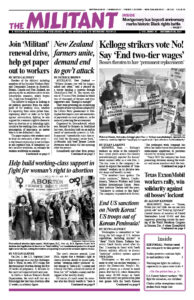Cosmetics, Fashions, and the Exploitation of Women by Evelyn Reed, Joseph Hansen, and Mary-Alice Waters is one of Pathfinder’s Books of the Month for December. Below are excerpts from the preface by Waters to the Cuban edition of the book. The Cuban publishing house Ciencias Sociales launched its Spanish-language edition at the Havana International Book Fair in February 2011. The preface is copyright © 2010 by Pathfinder Press. Reprinted by permission.
Two questions asked by thoughtful readers since the initial publication of Cosmetics, Fashions, and the Exploitation of Women are useful to consider.
First, are questions addressed in a debate over cosmetics and fashions more than fifty years ago still relevant? Aren’t they long bypassed?
Second, isn’t Reed’s article on “Anthropology: Marxist or Bourgeois?” outdated? Hasn’t knowledge of the earliest human societies moved far beyond what was known in the mid-1950s?
The response to the first question is underscored by Hansen’s rhetorical question in “The Fetish of Cosmetics.” In the whole history of capitalism, he asks, “has the bourgeoisie ever gone about cultivating the fetish of commodities more cold-bloodedly than American big business?”
The resources devoted by capitalist enterprises to advertising and the creation of markets, far from being a thing of the past, have expanded astronomically in the last half century as the working class has been pushed into “needing” everything from must-have cell phones, to the latest model automobiles, $500 torn blue jeans, an exploding array of “cosmetic” surgeries, designer handbags, and cosmetics-designed-to-make-you-look-like-you’re-not-using-cosmetics. All these and more are pushed on hapless “consumers” without truce. The pressure to be “fashionable” — that is, to be “employable,” and attractive to a potential spouse — has penetrated even more deeply into the working class. Television and the internet greatly intensify the all-pervasive intrusions.
The manufactured compulsion to “shop,” playing on the emotional insecurities of women and adolescents above all, has only deepened and spread. The “marketing” Hansen pokes such fun at in the 1950s seems amateur by comparison to the sales techniques employed today. “Shop until you drop” has gone from being a humorous exaggeration to a description of an actual social condition pushing increasing numbers of working-class families into more and more debt at usurious rates.
The impact of the twenty-first century capitalist advertising “industry” is, if anything, even more insidious as it spreads into areas of the globe previously buffered to some extent from the imperialist world market. In large areas of Africa, Asia, and Latin America, marked by imperialist-enforced agricultural and industrial underdevelopment, as well as in countries previously part of the now-defunct economic and trading bloc once dominated by the Soviet Union, the siren song of the commodity fetish is an imperialist weapon like none other.
In the eloquent words of the Communist Manifesto, “the cheap prices of its commodities are the heavy artillery with which [the bourgeoisie] batters down all Chinese walls. … It compels all nations, on pain of extinction, to adopt the bourgeois mode of production; it compels them to introduce what it calls civilization into their midst, i.e., to become bourgeois themselves. In one word, it creates a world after its own image.”
As the not-so-outdated polemic of the 1950s makes clear, in periods of working-class retreat such as we have lived through the last quarter century — a period of retreat far longer and more devastating than the relatively brief post-World War II interlude — the “heavy artillery” of capitalism takes its greatest toll, including among the most politically conscious layers.
The answer to the second question is equally important.
The articles by Evelyn Reed — “The Woman Question and the Marxist Method” and “Anthropology: Marxist or Bourgeois?” — are two of the earliest she wrote on these subjects. …
The focus of the sharp polemic in Cosmetics, Fashions, and the Exploitation of Women is what Reed often referred to as the “Hundred-Year War in Anthropology.” Here, as elsewhere, Reed defends the historical materialism of nineteenth-century anthropologist Lewis Morgan, whose work Karl Marx and Frederick Engels drew on extensively in their writings on the subject, and Morgan’s twentieth-century continuator Robert Briffault.
As Reed points out, one of the major battle lines in this century-plus war over historical materialism has been the question, does something akin to the modern bourgeois “patriarchal system of marriage and family relations [go] all the way back to the animal kingdom”? Or did what is often referred to as “patriarchy,” and the second-class status of women, arise in relatively recent times, on the scale of evolution, as a cornerstone of class-divided societies? As private rather than communal property came to dominate all social relations, including those between men and women, didn’t a small handful of men emerge for the first time as a ruling class, subjugating other men — and, in the process, women as well?
“Concealed behind the debate,” Reed explains, is “a question of class struggle and class ideology.”
If class society and the accompanying subordinate status of women is only a stage of human history, one that arose at a certain historical juncture for specific reasons, then it can be eliminated at another historical juncture for other specific reasons.
If there has been an evolution of social relations through distinct stages of the prehistory and history of human society, determined by increasing levels of labor productivity and changing property relations — and accompanied by enormous, and extended, conflict and violence — then capitalism is no more permanent than the property and social relations that preceded it. …
Today the fight to eradicate women’s subordinate status is not reducible to simply a “woman question,” Reed explained. It is an integral part of the working-class struggle for power, the battle for socialism.


